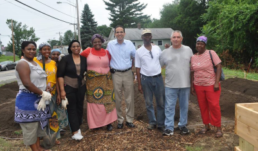Lots of Hope
Year Complete: 2014
Grant Amount: $50,000
Local Government: City of Providence, RI
Local Foundation: Rhode Island Foundation
Project Purpose
To transform vacant, city-owned lots into thriving centers of urban agriculture and pilot small-scale composting in Providence neighborhoods.
Key Lessons Learned
Lessons learned about tools and tactics through the project that other sustainability directors could use to advance their work.
The grant team worked with a well-established and highly-regarded middle party with technical expertise to prioritize buy-in from local elected officials and the neighborhood. The project also established clear expectations with all constituencies about cost and time, and designed the program for low resource growers to minimize pushback for use of city property for-profit. Other city departments were engaged in the development and implementation of the proposal to solidify the program in the city, and to build the relationship with the foundation beyond just the Sustainability Director.
Lessons for developing a collaborative process between a local government sustainability director and local place-based foundation(s).
Communication was key. In-person meetings were most effective for getting to know each other’s priorities and interests and developing projects that were mutually beneficial. It was also important to recruit practical partners. While the Sustainability Office was secure with a federal grant at the time, the Foundation was reluctant to make a grant directly to the new office. Having this grant directed to SCLT both addressed the concern of the Grants Program Director and substantially improved the reach of the program.
Make time for collaboration. Working together to develop the proposal took a bit longer than just doing it alone, but it ended up making the plan stronger.
Additional Information and Resources
The Lots of Hope Initiative launched in 2013 and provides Providence residents access to low-cost, underutilized public land from the city. The following year, the Lots of Hope initiative launched its second phase with its Lots of Hope Urban Greenhouse project. Unveiled in the summer of 2015, the greenhouse has since hosted about 5 growers, increased use of local foods in schools, generated approximately $10,000 to $15,000 in sales for the growers, and engaged 25-30 classrooms in garden-based curriculum integration, including a composting pilot where students learn about local food systems and reducing solid waste. More information on these efforts can be found here.

